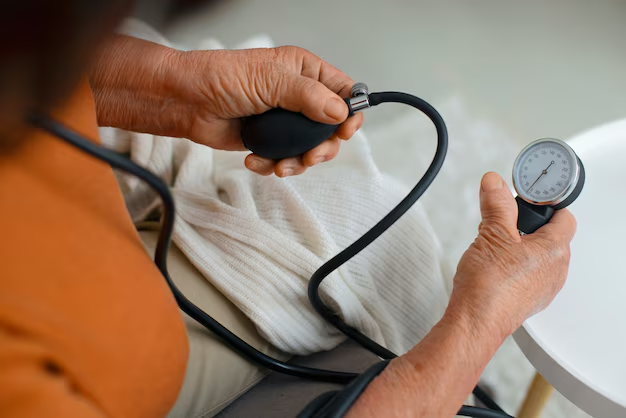Your Guide to Can You Feel Hypertension
What You Get:
Free Guide
Free, helpful information about HyperTension FAQ and related Can You Feel Hypertension topics.
Helpful Information
Get clear and easy-to-understand details about Can You Feel Hypertension topics and resources.
Personalized Offers
Answer a few optional questions to receive offers or information related to HyperTension FAQ. The survey is optional and not required to access your free guide.
Can You Tell If You Have Hypertension Just By Feeling It?
In our fast-paced, modern world, hypertension—commonly known as high blood pressure—has been dubbed the "silent killer." This ominous nickname hints at its deceptive nature, prompting the question: Can you feel hypertension? Spoiler alert: you usually can’t. Most people with hypertension experience no discernible symptoms, allowing it to stealthily wreak havoc on their health. However, this does not mean one should remain oblivious to its potential dangers. By shedding light on this condition, we can empower ourselves to take control of our well-being and seek proper management options.
Understanding Hypertension
Hypertension occurs when the force of blood against artery walls is consistently too high. While some may expect clear warning signs such as dizziness or headaches, these symptoms are not guaranteed and can be linked to various other health issues. High blood pressure often remains undetected until it leads to serious health complications like heart disease, kidney problems, or strokes.
Given its elusive symptoms, regular monitoring of blood pressure is crucial. Adults should check their blood pressure periodically, ensuring any upsurge is caught early. Routine health screenings and investing in a home blood pressure monitor can be valuable steps toward maintaining good health.
What Does High Blood Pressure Feel Like?
For those who do experience symptoms, they might face:
- Headaches: Though not exclusive to hypertension, frequent or severe headaches might raise concerns.
- Nosebleeds: Also rare, but possible in extreme cases.
- Dizziness: Occasional dizziness can appear due to a sudden increase in blood pressure.
It's vital to understand that these symptoms also relate to many other conditions and don't act as a reliable diagnosis of hypertension. Medical evaluation remains essential for accurate identification.
Financial Resources for Managing Hypertension
Maintaining regular healthcare routines and treatments for hypertension can become financially burdensome. Thankfully, numerous programs and options can ease these pressures:
- Government Aid Programs: Various initiatives, such as Medicaid, offer health coverage and aid for those eligible.
- Financial Assistance Plans: Many healthcare institutions and nonprofits provide financial plans to help manage costs.
- Pharmaceutical Assistance Programs: Some pharmaceutical companies offer free or low-cost medications to qualifying individuals.
Beyond Health: Financial Wellness
As hypertension underscores the imperceptible impact of stress, it parallels the unforeseen stress of financial constraints. While you might not "feel" your high blood pressure, you can indeed feel the weight of debt or financial struggle. Addressing these through strategic financial planning can contribute to overall wellness.
Consider exploring:
- Debt Relief Options: Programs that consolidate or reduce your debt burden.
- Credit Counseling Services: Seek expert advice to manage and improve your financial health.
- Educational Grants and Loans: Opportunities for further education that can enhance earning potential.
Key Takeaways
- 👀 Regular Monitoring: Periodic blood pressure checks are vital.
- 💊 Medication Assistance: Explore pharmaceutical programs for affordability.
- 🏥 Health Coverage: Investigate Medicaid and other government aid.
- 💲 Financial Advice: Credit counseling and debt relief for wellness.
- 📚 Educational Opportunities: Pursue grants and loans for future stability.
While you may not feel hypertension creeping up, taking proactive steps in monitoring and managing both your health and finances can significantly influence your quality of life. Empower yourself to stay informed and explore the resources available to nurture both your physical and financial well-being.
What You Get:
Free HyperTension FAQ Guide
Free, helpful information about Can You Feel Hypertension and related resources.

Helpful Information
Get clear, easy-to-understand details about Can You Feel Hypertension topics.

Optional Personalized Offers
Answer a few optional questions to see offers or information related to HyperTension FAQ. Participation is not required to get your free guide.


Discover More
- a 66 Year Old Female With a History Of Hypertension
- Are Eggs Bad For Hypertension
- Are Eggs Good For Hypertension
- Are Endocrine Disorders Causing Hypertension Rare
- Can Adderall Cause Hypertension
- Can Alcohol Cause Hypertension
- Can Allergies Cause Hypertension
- Can Anemci People Get Hypertension
- Can Anemia Cause Hypertension
- Can Antibiotics Cause Hypertension
